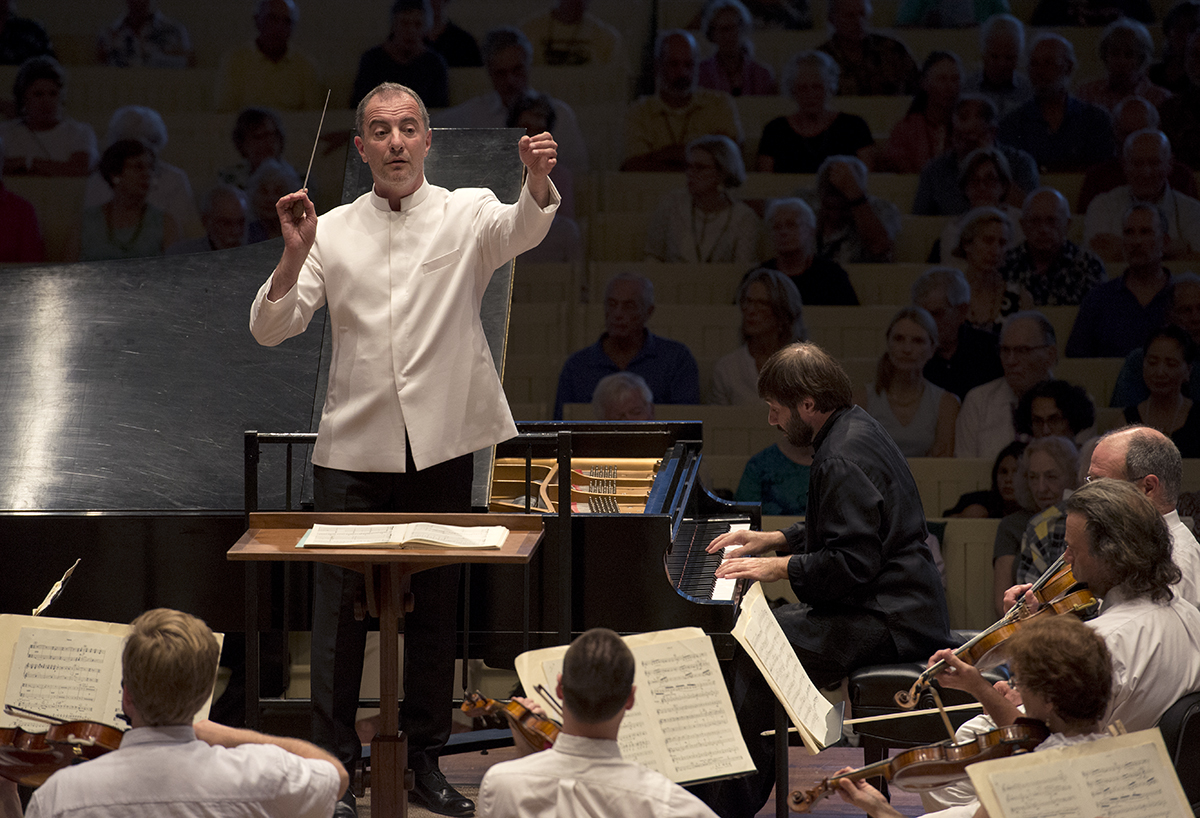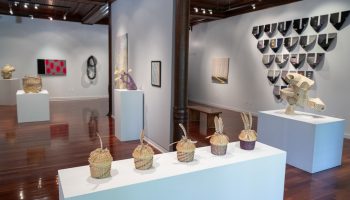[huge_it_gallery id=”12″]
Who was this Beethoven guy anyway? He is the most familiar of composers, but what do we do with him? To some he is the culmination of classicism. Others consider him the first Romantic, a wild-eyed, bomb-throwing revolutionary. Proto-punk or the ultimate establishment insider: which was he?
He’s both, of course, but the middle ground is a no man’s land for interpreters. Still, on Thursday night in the Amphitheater, music director Rossen Milanov and the Chautauqua Symphony Orchestra found a way to have it both ways.
The concert in a very hot Amp opened with a trim and fleet reading of the overture to the ballet The Creatures of Prometheus that nodded to classical equipoise and proportion while foreshadowing the coming revolution with weighty tuttis and a broad reading of the noble opening subject.
After intermission, Beethoven the arch-Romantic had his say with the Symphony No. 3 in E-flat, Op. 55, but he wasn’t so much an angry young man shaking his fist at the heavens as he was the avatar of Romanticism itself, looking down from the pantheon on his creation and pronouncing it good. Talk about your Promethean role reversal.
Milanov’s view of the landmark work was large-scaled, hefty and expansive. The gestures were large, accents were leaned into heavily, and the sound of the orchestra was muscular and solid, if maybe a bit brass-heavy. You could call it proto-Wagnerian.
After leaping to the podium and immediately attacking the two hortatory opening chords, Milanov settled into a main subject that was broad and flowing. The funeral march trod slowly indeed, with an almost Mahlerian weight and point, every moment underlined for maximum tragic effect. In the scherzo and the closing movement, forward motion was subordinated to an emphasis on contrast — in tempo, orchestral color and rhythmic accent. This is important stuff, Milanov seemed to be saying, and he underlined the thrust of Beethoven’s arguments like bulleted items on a PowerPoint slide.
This was Beethoven as father of Romanticism and the author of his own heroic narrative. Call it the “great man” theory of music. Milanov’s “Eroica” was commended to us as the important monument to Romanticism that it surely is, but its greatness was accepted as fact. Missing, perhaps, was an interrogation of why this music should matter, a shaking of fists at the musical heaven to which the “Eroica” has ascended by an early 21st century where everything is being questioned. Beethoven’s symphony is a touchstone to be sure, but it is also a revolutionary manifesto, a declaration of musical and artistic independence. It’s Beethoven’s Promethean assertion that we can be heroes just for one day.
Prokofiev, whose C-Major Piano Concerto was the program’s centerpiece, is in some ways as elusive as Beethoven. Was he the shocking modernist of the “Scythian Suite” or the Socialist Realist of the Fifth Symphony? Cosmopolitan and expatriate or Russian patriot?
They’re interesting questions, but they didn’t have a chance in the face of the pummeling juggernaut unleashed by pianist Alexander Korsantia and Milanov. This was big, extrovert Prokofiev in the grand Russian tradition, and the Georgian-born and Soviet-trained Korsantia attacked the music with athletic vigor.
Throughout, Korsantia produced a huge, meaty tone. Good thing, too, because Milanov and the CSO give him no quarter with the volume of the accompaniment. In the opening movement, he pounced on the dissonant clusters in the bass then wheeled and plunged into the whirlwind ascending passagework taken at a breathless pace.
In the second movement, Korsantia responded to the sardonically faux-classical melody with broadly Romantic gestures in a nachtmusik section that was very slow indeed. As in the Beethoven piece, rhythms were sharply accented and Milanov was alert to every detail of Prokofiev’s delicious scoring.
The finale with its extremes of contrast and hints of Shostakovich despair, was Russian Romanticism through and through, and there was nothing subtle about it or Korsantia’s pianism. This was a performance that was theatrical, extrovert and a bit impudent. It’s a big piece and Korsantia, Milanov and the CSO devoured it. The crowd roared their approval.
John Chacona is a freelance writer and producer in Erie, Pennsylvania, who writes about culture for the Erie Times-News.





